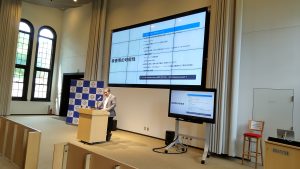The Institute for Global Governance Research (GGR) held its third Brown Bag Lunch Seminar on Wednesday, April 27, 2022, with Professor Nobumasa Akiyama (Graduate School of Law/Graduate School of International and Public Policy) speaking on the theme of “Nuclear Aspect in the Russo-Ukrainian War.” His lecture covered mainly three points.
First, the possibility of the use of nuclear weapons, while small, is not ruled out. He talked about two scenarios where Russia might justify the use of nuclear weapons. The first is the scenario where Russia claims as a pretext that Ukraine produces chemical and biological weapons and might use them. Russia has been using “false flag” operations to justify its actions and is attempting to establish the narrative that Ukraine is producing and possibly using these weapons. The second is the scenario where Russia uses the arms supplies of Western countries to Ukraine as a pretext and warns it may use small nuclear weapons to stop the supplies.
Second, Professor Akiyama discussed the implications of the “long shadow of nuclear weapons” on regional conflicts. If the United States is concerned about Russia’s use of nuclear weapons, it will create a “stability and instability paradox” where it feels reluctant to intervene. How should countries in the region surrounding the war protect themselves if a paradoxical situation of this sort affects the area? There is a concern that China may advance on Taiwan, which it considers to be a core interest in its region. Recently, there has been discussion about “nuclear sharing” in Japan, but Professor Akiyama argued what should be considered first is the initial step of whether or not to hold nuclear weapons. What are the national interests that Japan wants to protect? How is the retention of nuclear weapons positioned in its deterrence strategy? And is Japan prepared to assume the risks and responsibilities associated with sharing decision-making with Europe and the United States? Professor Akiyama indicated the need to address information concerning such questions.
Third, an analysis of the future outlook for international politics was presented. While a scenario of Russian decline is conceivable, this is not necessarily desirable given the country’s importance in the world market as a supplier of food and energy. Also, there is a “peaking trap” argument that the gap between great power consciousness and actual capabilities makes the country more likely to head for war, and this should be a matter for caution. Prominent focal points about the future are the transformation of energy markets and political changes in developing countries – especially the latter, as developing countries will be hit hard by increasing food supply difficulties. The possibility of a leadership battle between Western countries and China over mitigation of such difficulties was discussed.
During the 20-minute Q&A session, a number of questions and answers were exchanged, including the impact of Finland and Sweden joining NATO on Russia’s nuclear strategy; the possibility of China’s external nuclear deployment in relation to the Taiwan issue; the influence of the media in relation to nuclear threats; the changing role of international organizations in contributing to international norm building; the possibility of military aggression and nuclear proliferation through the retention or non-retention of nuclear weapons, etc. The third GGR Brown Bag Lunch Seminar was attended by approximately 60 faculty and students.
【Event report prepared by】
SUZUKI Ryohei (Doctoral Student, Graduate School of Law, Hitotsubashi University)
SUGAHARA Yuriko (Master’s Student, Graduate School of Social Sciences, Hitotsubashi University)

